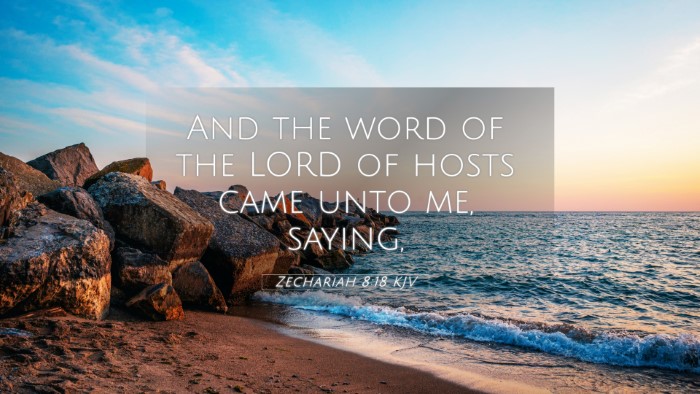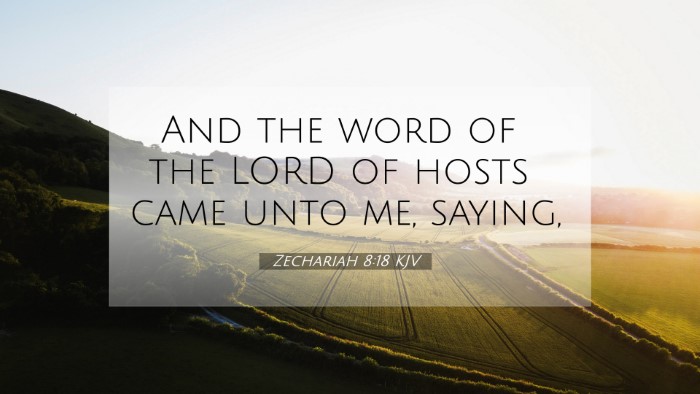Understanding Zechariah 8:18
In Zechariah 8:18, the Lord of hosts reveals profound truths concerning the future of His people and their worship. This verse states:
"And the word of the LORD of hosts came unto me, saying,
Zechariah serves as a prophetic voice during a time of restoration for the Israelites, bringing them hope and a renewed perspective on God's relationship with them. This verse emphasizes the joyful restoration of religious observances.
Verse Meaning and Commentary Insights
Various public domain commentaries provide insights into this verse, enriching our understanding:
Matthew Henry's Commentary
Matthew Henry emphasizes the importance of fasting in the life of the Israelites, elucidating that the fasts originally established for mourning would transition into feasts of joy. He interprets this as a demonstration of God's mercy, indicating that those days of sadness will turn into gladness and hope for the nation.
Albert Barnes' Notes on the Bible
Albert Barnes notes that the fasts were observed during a time of calamity, but the Lord promises that these will become times of joy and feasting. He highlights that God is shifting the national mood from mourning to celebration, which is indicative of His redemptive plan for Israel. The shift symbolizes a future time when God will bless His people for their obedience and restoration.
Adam Clarke's Commentary
Adam Clarke discusses the significance of the conditional nature of the blessings described in the verse. He interprets it as a call to repentance and righteousness, implying that once the people turn towards God's ways, they will experience these blessings. Clarke also points out the conversion of their mourning into joy as a sign of God’s faithfulness.
Connections to Other Scriptures
Zechariah 8:18 connects thematically and contextually with various other Bible verses. Here are some cross-referenced scriptures:
- Isaiah 61:3: "To appoint unto them that mourn in Zion, to give unto them beauty for ashes." This verse speaks of divine restoration and joy replacing sorrow.
- Joel 2:12-14: Calls for repentance and promises restoration, linking national repentance to divine favor.
- Luke 4:18-19: Jesus reads from Isaiah, proclaiming the year of the Lord's favor, highlighting the message of joy and healing.
- Nehemiah 8:10: "For the joy of the LORD is your strength," emphasizing the importance of joy in the life of believers.
- Matthew 5:4: "Blessed are those who mourn, for they shall be comforted," connecting mourning with eventual blessing and comfort.
- Revelation 21:4: "He will wipe every tear from their eyes," pointing toward a future without sorrow for God's people.
- 1 Peter 5:10: Suggests that after suffering, God will restore, support, strengthen, and establish believers, aligning with the theme in Zechariah.
Thematic Connections and Cross-Referencing Insights
The themes of hope, restoration, and transformation are recurring throughout the scriptures. These connections provide a comprehensive understanding of God's intention for His people.
How to Use Bible Cross-References
Using a Bible concordance or a cross-reference Bible study guide can greatly enhance your comprehension of scripture. Here are tools that can help:
- Bible Concordance: Useful for quick reference to themes and words.
- Bible Cross-Reference Guide: Helps in linking similar scriptures.
- Bible Reference Resources: Online and print resources available for deeper study.
- Cross-Referencing Bible Study Methods: Techniques for connecting verses.
Conclusion
Zechariah 8:18 points toward a remarkable promise — that grief will be transformed into joy. By understanding this verse alongside related scriptures, we gain a broader picture of God’s plan of restoration for His people. This interconnectedness invites believers to reflect on God’s continuity throughout the Bible, revealing His loving nature and commitment to bring His people from mourning into joy.
In summary, exploring Bible verse cross-references provides deeper insights into the texts, enriching our spiritual understanding through the connections between Bible verses and the overarching narrative of hope and renewal.


